Annika Shoup: Q&A With Easy Company's First Female Infantry Soldier

The stories of our nation’s heroes date back to the start of the Revolutionary War, and they’re still arising today. As a strong supporter of the U.S. troops, we’re proud to use our platform to share some of these stories and honor the brave men and women who have answered the call to serve and protect our country.
This summer, in honor of the Army’s 249th birthday, we’re highlighting U.S. Army Specialist Annika Shoup of the 101st Airborne Division, 2nd Battalion, 506th Infantry Regiment. Shoup was the very first female infantry soldier to join the company, famously known as “Easy Company,” helping pave the way for women in combat – a role that was banned before 2016.
In this article, we’ll share our interview with Shoup, who talks about her experience integrating into the company, the time she spent deployed to East Africa, and her hope for the future of women in the military.
Q&A With U.S. Army Specialist Annika Shoup
Q: Tell me about your time in the service. What were your duties and responsibilities?
“I joined in 2018, but I ended up actually getting into my unit after training closer to 2019. My job was 11 Bravo, which is an infantryman. I started off in Charlie 258 in basic training and then when I got to my official unit I was in Easy Company 2-506.
Toward the end of my service I was a team lead for a little while, but most of the time that I was in I was a SAW gunner and I also was our platoon armor. As the armor, I kept track of the weapons that were assigned to my platoon, and I had to go and make sure that they were maintained. Most of my job was just keeping track of everything and making sure everything got in and out of the armory okay. I had to sign things out to people and keep a lot of paperwork and keep track of dates and serial numbers and stuff. So every time we would go out to the field or to training, then they would have to come to me to sign out their weapon so that I could have a paper trail of where it was going.
Also, for a while, I was the truck person. I would drive mostly my platoon, but oftentimes the company as well because for a while I was the only person with a license to drive the big trucks. So I did that, and then every Monday I would go and do checks on the trucks and work with the mechanics to get things fixed.”
Q: How does it feel to be the very first female infantry soldier in your company? What does that mean to you?
"Honestly, it was pretty intense. It was a huge honor, especially since it's such a famous company. So I think it was a pretty huge honor, but it was also kind of a good pressure to be under because I knew I was paving the way for others to come behind me. So to me, it was pretty cool and I tried my best to be a good example for those coming after me.
I do want to say that when I arrived, there was already an officer there who was a woman. She was there a few months before me, so she was actually the first woman in the company. I was the first enlisted female infantryman who was there. But it was a huge honor, seriously, and I still take a lot of pride in it.”
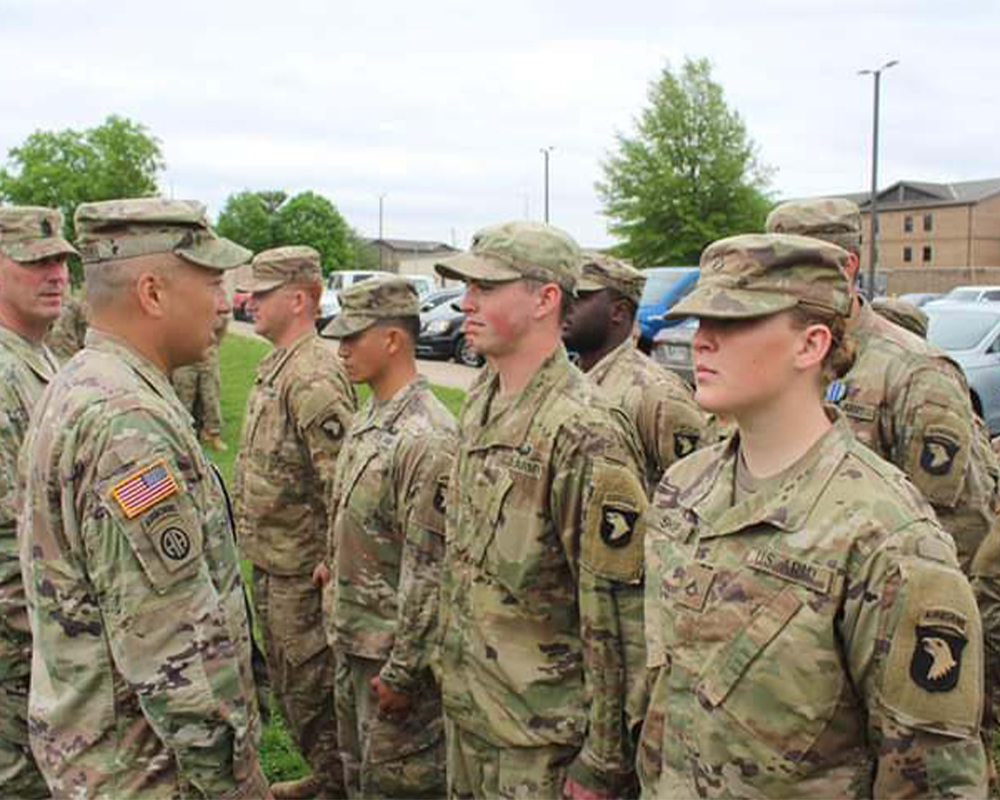
Q: What prompted you to join the infantry, specifically?
“Well, I guess I always kind of wanted to join the military. A big inspiration for me was my grandpa. He was in the Air Force, and he always talked about all of his stories and his experiences in there and all of the people that he met and the beautiful things that he got to see. It really seemed to impact him in his life. So he was a big reason that I wanted to join when I was a kid, and then it kind of manifested from there.
For a long time, I actually wanted to do the plane stuff, but the older I got, the more I wanted to just experience what it was like to be a soldier. I was just kind of drawn to what a soldier is, what it represents, in a way. I just wanted to experience that, so that's what I chose.”
Q: Can you tell me a little bit about your initial training? What was it like integrating into a previously all-male infantry unit?
“Well, there were definitely physical challenges. I did a lot of practicing before, but when I actually got there, it was a little bit more challenging than I expected it to be. Mentally, it wasn't as challenging for me because I was expecting the treatment. We weren't treated great, but that's kind of the point when you get to basic. The point of basic training is, they take you mentally and physically and they, this is going to sound harsh, but they kind of destroy you so that they can rebuild you into what they want you to be.
Mentally I was prepared for that, so it wasn't as challenging for me in that regard, but physically it was a little bit more challenging just because I had not really practiced as much as I should have, and I ended up with a fracture in my tibia. So it was a little bit more difficult for me to overcome that just because I had to kind of overcome the mental idea of resting when you're injured. I just had to fight through that.
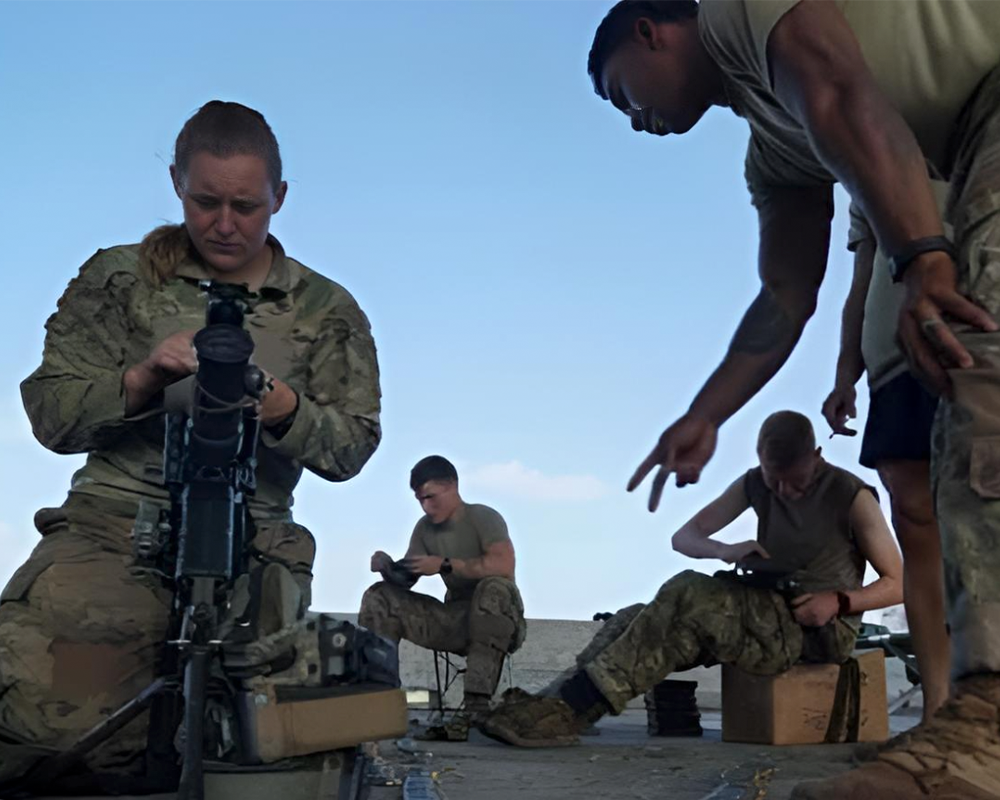
Probably the biggest challenge that I was faced with personally in basic training was the camaraderie aspect of it because a lot of people were really accepting and really supportive, but then I experienced a lot of pushback because of me being a woman. A lot of the other trainees that I was training with didn't want me there, and that went for all of the other women who were training with us. It was to the point that when we all graduated, they would cross our names off of all of the things that were camaraderie-based. So that was probably one of the biggest challenges. I expected there to be a lot more camaraderie and acceptance, but there wasn't. Alongside the physical challenges of having been broken and having to push through that.
I will say a lot of them were actually really open to the idea and really supportive. It was not every one of them. I want to make it clear that there were a lot of really supportive male trainees that actually did have our backs and I ended up being pretty cool with a lot of them. So it was not every single one of them. And the drill sergeants themselves were not like that. Both of the drill sergeants assigned to my platoon were male, and they were both extremely supportive and they did not have any type of discrimination whatsoever. I just want to point out that all the leaders and a lot of the male trainees were pretty supportive.”
Q: Were you ever deployed during your service, and what did you take away from that experience?
“In 2019, Easy Company was deployed to Djibouti, Africa. It was supposed to be a six-month deployment and we ended up getting extended to nine months because of COVID-19. I actually had a good experience over there. The reason we were there was strictly to respond to a crisis if it happened. So it was a lot of training, a lot of physical exercise, a lot of really hot weather, but it was mostly training-based.
We did get activated once. Like I said, our job was to respond to crisis if it happened. Basically, there was an airfield that was shared by Kenyan military and U.S. Military that was attacked, and a few people passed away. We ended up going there to make sure that it didn't happen again, to have a presence and get the people who attacked the airfield.
We were there twice. The first time we were there, I think it was like a month or maybe a little less than a month, and then we all went back to Djibouti because the National Guard came after we got everything set up and cleared. But my platoon ended up going back for about a month after that, and we ended up staying in the actual base that time. The first time we were there we were on the airfield where we were keeping watch 24/7. Basically, we were pulling watch, making sure that nothing happened again. And then the second time that I went back, I was actually guarding the base itself instead of the airfield.”
Q: How did serving in the infantry challenge you mentally and physically in ways you may not have expected?
“Physically, I expected it to be challenging, but I didn't expect it to be as challenging as it was. I thought that I'd be better at things than I was haha. But I think the mental part was accepting what we were training for because what we were training for was to fight and possibly die. That was kind of the point. So I think that mentally it was just accepting that and being okay with it and also just accepting that not everybody would want you there and just being yourself anyway. Even though people were actively trying to get rid of you, just focus on you and compete with yourself and don't compete with other people because you'll just destroy yourself that way.”
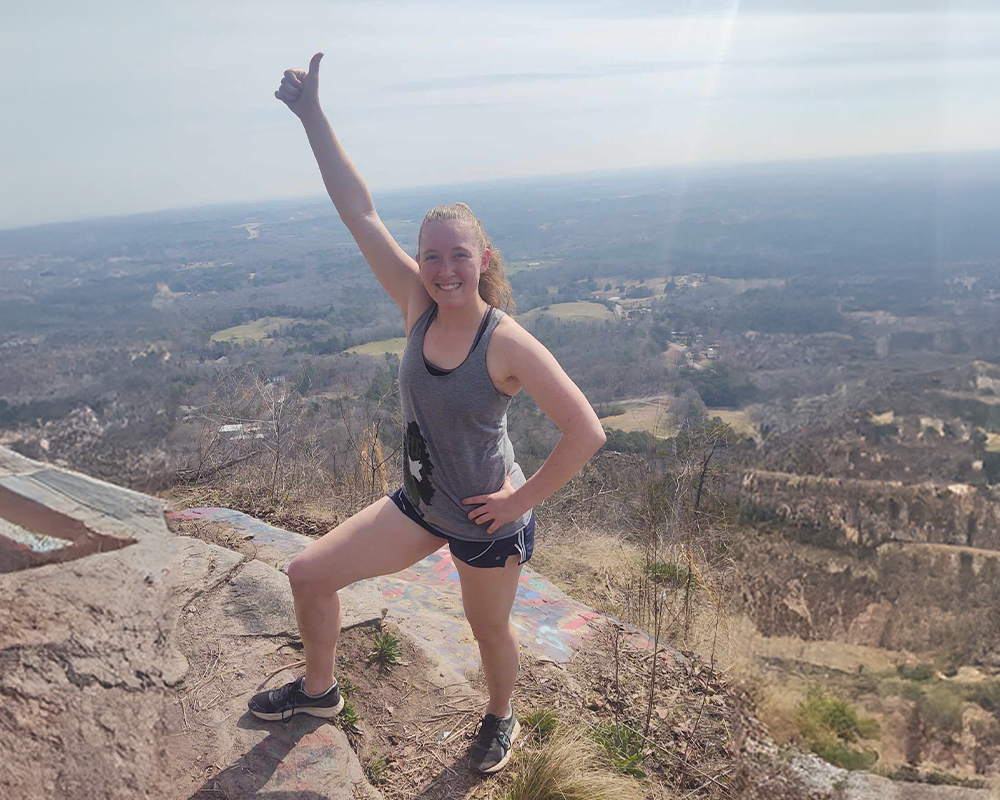
Q: Is there anything you wish civilians understood about military service, or are there any misconceptions you’d like to address?
“It doesn't really bother me too bad when there are misconceptions, just because I know that it's really difficult to actually understand unless you're there. But it doesn't really ever bother me too, too bad. People take it pretty seriously.
I think that maybe people need to understand the military and the point of the military a little bit better. Like, it's not just all fun and games and then free Applebee's on Veterans Day. Because the military is the barrier between the enemy and the people. I think that it would be important for people to understand that because it's their military, it's for them. So I think that they need to understand the structure of it. They need to understand what people are doing. I think they need to be more educated just because it does affect them.”
Q: How has being in the Army influenced your worldview or changed your perspective?
“I think it matured me, for sure. I think it's helped me understand other people a little bit better, and I think it helped me understand myself a lot more. When I first got there, it was all about being accepted by my peers in there. And then, after a while, I learned that isn't what it's all about. So I guess for myself personally, I realized and learned that there are going to be people who don't like you, and you just need to do you and be okay with that because, at the end of the day, it doesn't matter. It helped me to figure out who I am and be okay with it when other people aren't.
Another big thing that I learned when I was in the military is that the world is a lot bigger than the United States, and there's a lot out there that I think people should be seeing and experiencing. It's not necessarily a happy place out there. I think it opened my eyes to what the world actually is and how people actually are, how people are living. We talk about it, but it really opened my eyes to what's actually going on out there.”
Q: What qualities or skills do you think women uniquely bring to combat roles that were traditionally male-only?
“Honestly, we bring a lot. Most women that I met in the military have a lot of heart. They bring a lot of focus to the group because they have a focused mindset. They have a goal, and that's where they're going to get to, so I think that women in leadership positions, especially, can bring a lot of goal-based focus and actually get people to the objective. Because that's the mindset that women have to have in the military, is you have to get there at all costs. I think a lot of it is once a woman in the military comes up with an objective, they’re going to get there. I think it's a lot of focus, a lot of energy. A woman has to fight for every step that she takes, so once she achieves a leadership position I think that she could take whoever is underneath her and really help them to grow and to thrive and to learn in a really focused way. I think it could maybe bring a little bit more perfectionism back into the military.”
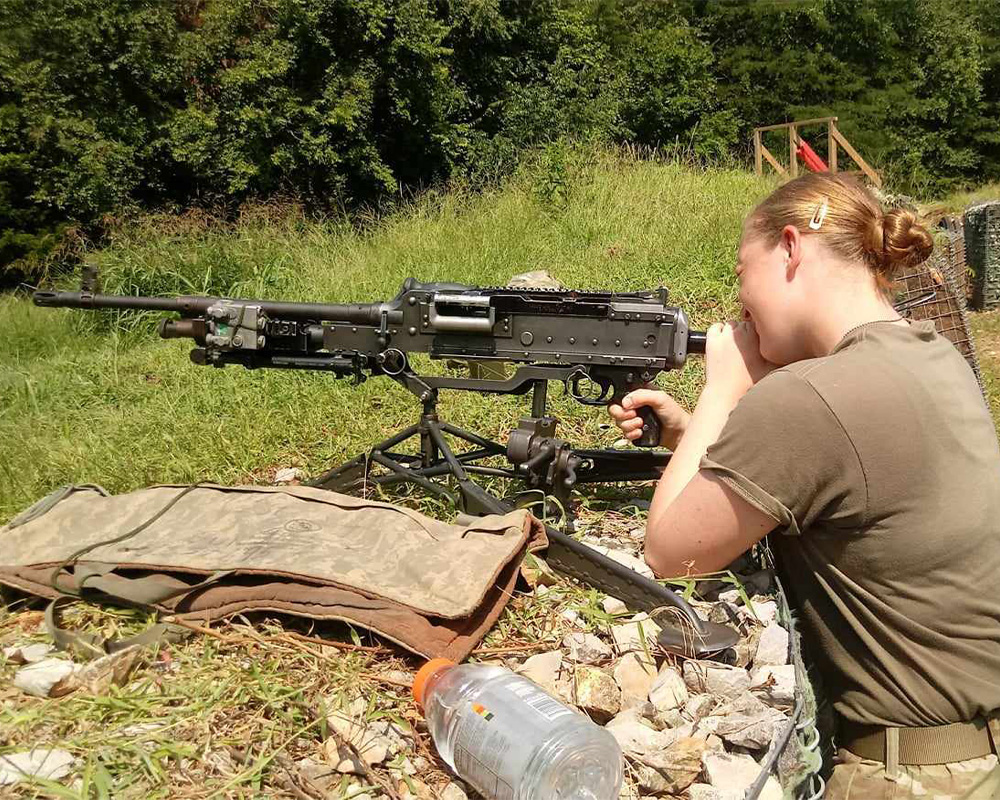
Q: What were some of the biggest misconceptions about women in combat roles that you hope you and other women in the military can dispel?
“There's a lot, actually. There are a lot of negative stereotypes about women in the military. A lot of men think that women coming into the combat MOS, or just women in the military in general, are going to get pregnant, they're going to get injured so that they don't have to do anything, they're weak, they don't want to actually do their job, and they're going to SHARP you for no reason. But most women in the military aren't like that. They're there to do their job. Like I said earlier, they're really focused, and they're really goal-oriented. They had to fight for every step they had to take to be at that point, and a lot of these women that I met were actually just as strong physically as a lot of the guys in the company. They were able to keep up running, they were able to keep up rucking, they were able to keep up on all kinds of stuff. A lot of physical strength and a lot of mental strength is required of women to come into the military, and we have a lot to prove.
The excuse that most guys gave me for not wanting me there, and I heard this from multiple people, they told me themselves, that their concern was that if we were in a combat situation, they wondered if I'd be able to get them out or not. Well, the thing is that we were training all the time. I was able to actually pick them up and carry them running across the field. So I proved them wrong on that, but they kept saying it. I think it was an excuse more than anything, because there were guys that I was stronger than, and I don't think they ever heard that. So there's a lot of stereotypes and discrimination right now, but hopefully I opened some people's eyes at least.”
Q: Do you have any funny moments, fond memories, or stories from your time in the service that you’d like to share?
“Well, first and foremost, I met and married my husband. He was in the same company as me, so I think that was probably a good thing haha.
A funny story from my platoon is we had a building where we all went for work. And, basically, there was a room that you could go in with a gym and you could hang out in there. And when it got kind of rough we would go and hide in there. Well, not really hiding, but we called it ‘shamming,’ which is basically slacking off on purpose because we didn't want to be there that day. Anyway, after a while, the admin company’s building was under construction or something and they got moved into our building and they took over our little room there.
It was really awkward and we were all kind of upset about it because we didn't have anywhere to go. And some of the guys came up with this idea to put a dead fish in the ceiling panels. So a couple of them went over there and put a dead fish in the ceiling panels. I was there, I didn't participate necessarily, but, oh my gosh, the entire building reeked. It was awful. The next few days, all of our leadership was asking us if we knew anything, and all of us were like, oh, no… That was probably one of the funnier things. I don't remember how they found it, but I'm pretty sure that they never found out it was us. They stayed in the building, but it was definitely an ordeal and we all suffered for it. I have a few funny stories about basically the guys stinking up the entire building.”
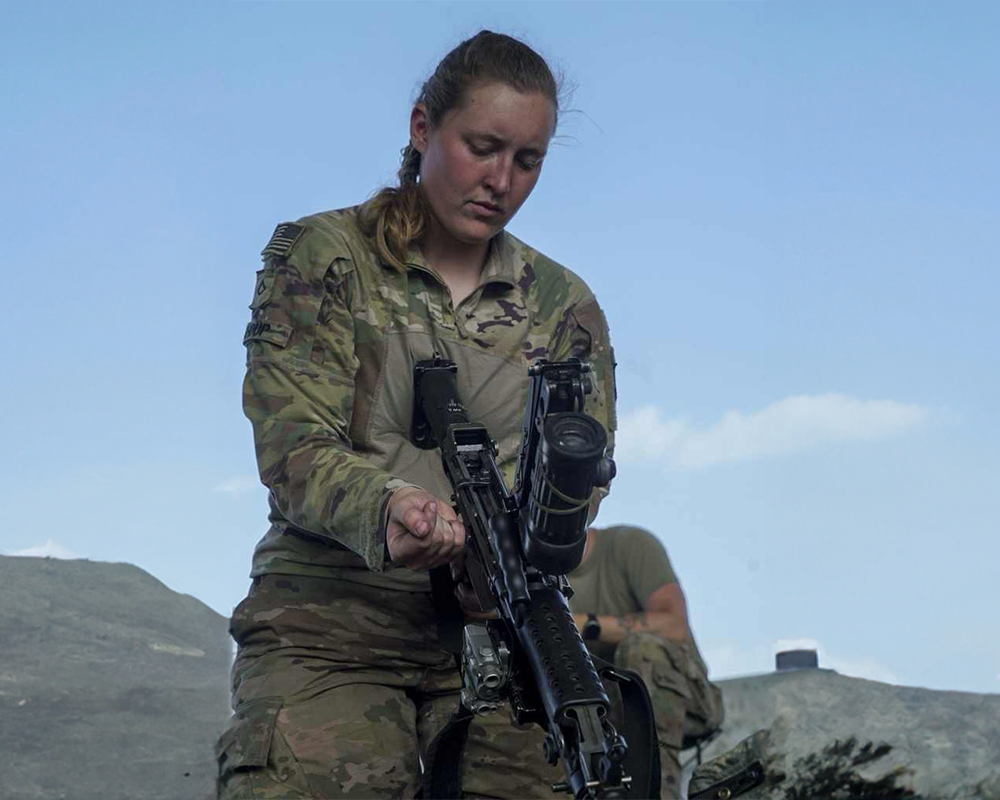
Q: Tell me about what you're doing now that you're out of the service. How has the transition from military to civilian life been? What are your plans for the future?
“Well, I got out in December 2021, so I've been out for a little while now. I started school right away and I studied psychology. I traveled Europe for a while trying to get over there with my husband who was still in service at the time. And then we ended up in South Dakota, where I currently work at a natural food store healing people with natural remedies and supplements. I just graduated, and I might continue with my master's degree. I haven't thought about it too much. I guess the future is wide open for me right now. I used to have a lot of plans, but now I'm just kind of figuring it out as I go.
The transition has been good. At first, it was really hard because I wasn't working while I was trying to get over to Europe where my husband was stationed. That was pretty hard because I felt like I wasn't doing anything, which I wasn't. That was hard. The biggest thing that they warn you about when you're getting out of the military is that you're going to feel like you don't have a purpose anymore. Well, that's the biggest thing I was warned about anyway, and that was definitely true for me. That first year and a half probably, I didn't really feel like I had a purpose anymore. I was working in a clothing store and I just didn't feel like I was doing anything for anybody, you know? I didn't feel like I was doing anything super important. But now I'm working in the natural food store and I have people telling me that what I told them actually helped them, so I feel more like I have a purpose now. The transition since I got this job at the natural food store has definitely been healing. My boss is awesome, so that's kind of helped me to transition from the leadership in the military, which can be a little rough, to leadership in the civilian world, which is a little bit more easy to work with.”
Q: Do you have any words of encouragement or advice for women who are thinking about joining the military?
“I would encourage people to join. I actually really enjoyed my time in the military. I would not necessarily recommend infantry to everyone, depending on personality, but there are a lot of options job-wise that I think a lot of people would really thrive in. So, I would encourage people to join the military. It really is important. It was a really good job and I think everybody has different experiences in it, but overall, the job was actually really fun and I don't regret it a single bit. I would do it again if I had to.
As far as advice, straight off the bat, I would tell them to not worry so much about what the guys are thinking about you. You don't have to change yourself to be accepted by them just because they're telling you to. You don't have to say certain things or behave a certain way. You don't have to pretend to be a guy to be accepted by them. Because if they actually have good camaraderie, and if they actually have your back, then they'll accept you for being a woman because, at the end of the day, that's what you want. That's what camaraderie is – a group of people who have your back. And if someone is treating you so poorly that you feel like you have to change yourself and pretend to be something you're not, then those people don't have your back.”
Support For Our Troops
Vedder Holsters is proud to support our U.S. troops and military veterans. If you are a current member of the U.S. Armed Forces or a veteran, we would like to thank you for your service with 10% off any purchase at Vedder Holsters.
If you’re looking for a new IWB, OWB, or pocket carry holster, visit our Holsters by Gun Model page for Kydex holsters that are custom-made for your weapon of choice. Interested in items beyond holsters? Check out our Resources Page for links to recommended products like lights, lasers, first aid, maintenance, and more, and browse our selection of apparel, and accessories at our website, vedderholsters.com.
If you’d like to connect with other like-minded women in the gun community, join our Facebook Group, Women of Vedder, for all things concealed carry and self-defense, or visit us on Instagram for more content and tips.
To stay up-to-date on all the latest Vedder Holsters content and offerings, check out our blog and follow us on Facebook, Instagram, Twitter, and TikTok, or download our FREE E-book The Concealed Carry Blueprint for all the tools, tips, and tactics you’ll ever need for successful concealed carry. And be sure to visit our sister company, GeoGrit, for all your American-made minimalist wallet needs.

